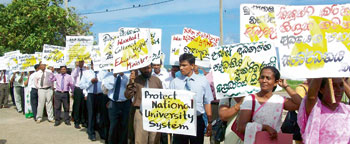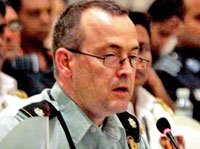No one would contest that there is a severe crisis in University education, as much as in education in general. The fact that there are serious crises in other spheres too should not blind us to overlook this as just another issue facing the country. But what is this crisis about? And why is it receiving so little attention in a country that is traditionally very much concerned about the education of its children? I would like to suggest that this is because of the complexity of the issues involved, and that the potential participants in the discourse are fragmented in many directions.
 |
| Lecturers from 13 universities in the country protesting
on Monday over the salary issue in Matara |
The immediate issue, from the point of view of University teachers is the positive disregard and the lack of respect shown to their profession by the government and the resultant discounting of their long-standing requests for a salary revision. From the student’s point of view, it is the ‘leadership training’ that has been made compulsory for all new entrants to the state universities.
Others have raised the issues of University autonomy, low quality of teaching, the near absence of research, lack of responsibility and accountability, the on-going privatisation of higher education and a host of others. In the absence of a general policy regarding salaries and wages, a possible settlement regarding the salaries of academics while disregarding all the other related issues will lead to plethora of other demands from other sectors. However, an immediate resolution of this issue is of utmost urgency – the Universities have been dysfunctional for more than a month now, and any further disruption will result in further deterioration of the state University system, perhaps making any restoration impossible.
We need to recognise that these are inter-related problems, but also come to some agreement about the priorities.
The immediate priority should be getting the Universities back into ‘normal’ functioning, while recognising that ‘normal’ functioning has long been unsatisfactory. This should involve a reasonable settlement regarding academic salaries, while proposing a salary structure acceptable to other sectors of the University staff.
The contention that the country can ill-afford a substantial increase in academic salaries does not hold water, given the very high salaries paid (and perks provided) to others by the state.
It is unreasonable to assume that the other problems of the Universities will go away if the salary issue is settled. Even with an attractive salary structure, the Universities will have to rebuild the atmosphere of tolerance and freedom if they are to attract quality staff. The amendments to the Universities Act that have made the appointments to the top academic posts (those of Vice Chancellors) into political appointments need to be rescinded if we are to start on the path of recovery. The making of the Vice Chancellors into political animals has resulted in the politicisation of everything including the curriculum that has now culminated in the introduction of a training programme designed from outside the Universities.
It is regrettable that some former Sri Lankan academics who now live overseas have opined that autonomy only applies to Universities in the west. This ignores the traditions that were in existence in this country (say, at Mahavihara and Abhayagiri, which were propounding contrasting theories) long before there were any institutions worth mention in the west. It reminds me of the words of Macaulay that Indians need no education, as they were destined to be coolies governed by the British, who will do all the thinking for them!
It is becoming increasingly apparent that there is a movement afoot to systematically discredit and destroy the state universities, perhaps to create an opening for the proposed private universities. However, it is worthwhile to note that the best private universities in the USA are NOT profit making institutions, while any private institution in today’s Sri Lankan context would be for the sole purpose of making money, and their quality would invariably be even lower than that of the present state Universities.
The words of Prof. J.E. Jayasuriya in his ‘Education Policies and Progress during British Rule in Ceylon (Sri Lanka) 1796 – 1948’ where he stated that the movement to destroy free education commenced on the very day that the (free) education ordinance was enacted, is true even today.
It is only pressure from the public that will ensure that the crisis is sorted out without further delay by granting a reasonable salary structure for the academics, re-establishing the independence of the Universities and ensuring their public accountability by suitable legislation and avoiding a future conflict by resolving as-yet-to-arise salary issues of the other staff. It is only public pressure that forced the then government to introduce free education in the early 1940s, and it is conceivable that only public pressure will enforce a solution to this problem today.
On their part, the academics must demonstrate that they are ready to respond to such a reform that is bound to present them with many challenges.
H. Sriyananda,
Via e mail
Make the most of US Defence Attaché’s testimony on real war situation
Lt. Col. Lawrence Smith’s comments about the situation in the last phase of the war in the North and the East have rattled his bosses in the US. The comments were made at the recent seminar on “Defeating Terrorism – The Sri Lankan Experience”, at which presentations were made on Sri Lanka’s military success against terrorism.
The US State Department rushed a statement saying Lt. Col. Smith’s comments were his own and did not reflect what the US government thought. The US government has taken a stubborn stand on Sri Lanka, and does not accept anything that contradicts its view.
 |
| Lt. Col. Lawrence Smith
at the recent seminar |
Lt. Col. Smith’s observations cannot be refuted.
First, he says “offers for surrender came not from the high-ranking LTTE leadership but from Nadesan, KP – people who were not and never had really demonstrated any control over the leadership or combat power of the LTTE.”
Second, and more important, Lt. Col. Lawrence Smith has given credibility to what our Army commanders have been saying all along: “But I can say that the version that was presented here so far in this is what I heard as I was here during that time,” he said.As Defence Attaché, he was the person directly exposed to the ground realities. He would not have been scratching around. His job was to study the real happenings on the war front and report to the US State Department.
The attitude adopted by the US towards Sri Lanka is clearly not based on Lt. Col. Smith’s reports but on the lobbying and propaganda of the LTTE and its cohorts. Justifiably aggrieved, Lawrence Smith decided to come out with the truth when he had the opportunity.
The big question is why did the US Government decline Sri Lanka’s invitation to participate in the conference, either as a speaker or as a panelist? The obvious choice as a panelist should have been the Defence Attachés. But the US Government could not trust him, as he was privy to the truth.
Defence Attachés are generally highly trained intelligence officers. They supply their respective governments with information on all sensitive matters. Let us hope the international organisations sitting in judgment over Sri Lanka will take note of Lt. Col. Smith’s testimony, which is damning evidence against the canards spread by the LTTE lobbyists.
Our Ministers and our diplomats representing Sri Lanka should maximise on Lt. Col. Smith’s testimony.
Edward Gunawardena,
Battaramulla |



